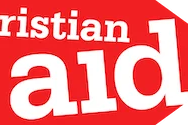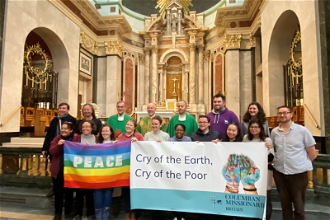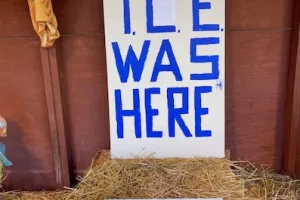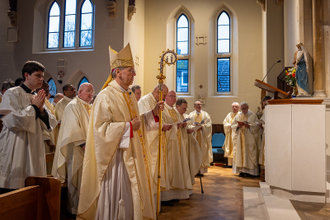Net-Zero: Catholic Church: guidance released

Guidance has been released today for the Catholic Church in England and Wales on accounting methods for net zero carbon. This 'Guidance on Catholic Diocesan Carbon Accounting' presents a step-by-step guide specifically for a Catholic diocese, and is the second in a series of planned documents from the 'Guardians of Creation' project.
This new document presents a method to set a baseline carbon footprint, to measure progress, and provides guidance on setting 'net-zero' targets. Having already piloted this process, the Diocese of Salford is estimated to be responsible for the equivalent of fifteen hot air balloons of carbon dioxide a day through the operational use of its buildings alone, and is now working on a decarbonisation pathway.
Catholic dioceses contain churches, schools, religious orders and associated offices and properties which collectively have a large carbon footprint. By providing a method to calculate this footprint, a diocese will then be able to set out a plan to reduce it and to prioritise action.
Bishop John Arnold, lead Bishop on the Environment at the Catholic Bishops' Conference of England and Wales, said: "it is encouraging that as COP26 gets underway we can show that we are taking the challenge of reducing our carbon footprint seriously with the release of this guidance. We know that the situation is urgent, and that we all have a responsibility to reduce the effects of climate change on the most vulnerable. I'm pleased that this is one of many initiatives being taken forward by the Catholic Church in this area, and I certainly feel like we are making some progress."
Over the past year the dioceses of Plymouth, Westminster and Birmingham have announced their carbon ambitions for 2030. Brentwood and Salford dioceses have both recently released guiding documents for their environmental efforts, and 'The Journey to 2030,' a project run by Catholic laity, has also launched a new website to help parish communities respond to the ecological crisis.
The 'Guardians of Creation' research project is being developed by the Diocese of Salford, in collaboration with St Mary's University, Twickenham, and the Laudato Si' Research Institute, Campion Hall, Oxford. Emma Gardner, Head of Environment for the Diocese of Salford and lead on the Guardians of Creation Project, said "over the last year we have been working closely with Inter Diocesan Fuel Management and the Tyndall Centre at The University of Manchester to understand what emissions a diocese should be reporting on, and by how much and how quickly we can reduce our carbon footprint. Having been through the process ourselves we hope this guidance will make the experience much more straightforward for other dioceses at this critical time. The Diocese of Salford is keen to work on our next steps, developing a decarbonisation plan for the Diocese of Salford"
The methodology is intended to be applicable to any diocese but offers especially detailed guidance for dioceses in the UK. Roland Daw, Senior Lecturer in Strategy and Entrepreneurship at St Mary's University and lead author on the report said "although one can see general strategic direction on decarbonisation coming from the top in the Catholic Church, the actual planning and implementation of decarbonisation is managed in the mid-range organisations of the Church - the dioceses. This means that if you want to help the Church decarbonise as a whole, you actually need to design an approach that works in all its parts. We've built some flexibility into this method, but there should also be enough commonality for the dioceses to talk to each other."
On 4 October Pope Francis with nearly 40 other faith leaders presented Alok Sharma, President-Designate of COP26, with a joint appeal calling on the international community to raise their ambition ahead of COP26. "Future generations will never forgive us if we squander this precious opportunity. We have inherited a garden: we must not leave a desert to our children." The appeal committed signatories to greater commitment themselves, including "supporting actions to reduce carbon emission" and making "bold plans to achieve full sustainability in our buildings, land, vehicles and other properties."
Fr Dominic Howarth, Episcopal Vicar for Youth Ministry and Pastoral Care, and Environmental Lead, Diocese of Brentwood commented: The "initial document arrived at a time when we were considering our Diocesan response; in addition to divestment from companies trading in and producing fossil fuels, the Guardians of Creation work led us to begin a systematic, professionally-led review of all our building stock, with a view to understanding the most effective and significant routes to decarbonisation. Without the clarity, insight and detail of the Guardians of Creation document, we would not have been able to arrive at these conclusions, and nor would we have been able to begin to implement them. Their work is leading the Catholic Church nationally in helping us to implement Pope Francis' call to action in Laudato Si', ensuring our Care for our Common Home and living a faith-filled response to 'the Cry of the Earth and the Cry of the Poor'. For all of this we are immensely grateful."
Deborah Fisher, Caritas Manager at the Diocese of Plymouth commented: "We have found the strategy document helpful in clarifying our own thinking about how to tackle an issue that can feel very overwhelming. We are looking forward to the Carbon accounting paper as we plan to use this as the basis for a one year project to establish a baseline for our Diocese on which we can build concrete actions and plans."
Barbara Hungin, Diocesan Environmental Lead for the Diocese of Middlesbrough said: "The Guardians of Creation project has proved to be of vital importance for the Church nationally as we focus on a response to Pope Francis encyclical 'Laudato Si' and the current climate crisis. Middlesbrough Diocese has recently created a new post of 'Building and Environmental Surveyor' and the Decarbonisation Strategy Document has proved to be a significant blue print for the way forward. It was sent to all the interviewees and will be one of the foundation documents for the new appointee."
Read the full document here:
www.stmarys.ac.uk/research/areas/theology-and-ethics/guardians-of-creation/resources.aspx


















